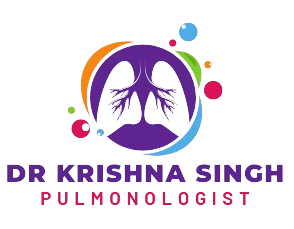
COMPREHENSICE CARE FOR PULMONARY EMBOLISM IN BHOPAL
Pulmonary embolism (PE) is a serious medical disorder that occurs when one of the pulmonary arteries in the lungs becomes blocked. This blockage is typically caused by a blood clot that moves from another region of the body, most commonly from the deep veins of the legs (known as deep vein thrombosis, or DVT). When a blood clot forms in the pulmonary artery, it can impede blood flow to the lungs, potentially causing death. Dr. Krishna Singh, Bhopal’s leading pulmonologist, specializes in pulmonary embolism treatment and provides excellent care to patients in Bhopal and the surrounding areas.

SYMPTOMS
- Shortness of breath that appears unexpectedly and may increase with physical activity.
- Chest pain that can intensify with deep breathing or coughing.
- Rapid heart rate.
- Hemoptysis, or coughing up blood.
- Feeling lightheaded or dizzy.
- Unexplained sweating.
- Leg swelling (if caused by deep vein thrombosis).
CAUSES
Deep vein thrombosis (DVT)
Blood clots that form in the deep veins of the legs or pelvis can break free and travel to the lungs, causing pulmonary embolism.
Immobility
Prolonged periods of inactivity, such as long flights or bed rest after surgery, might increase the risk of blood clot formation.
Surgery
Certain procedures, particularly orthopedic surgeries like hip or knee replacement, may increase the risk of developing blood clots.
Cancer
Certain types of cancer and cancer treatments can increase the risk of blood clots.
Other risk factors
Pulmonary embolism include obesity, smoking, pregnancy, hormonal birth control, and a family history of blood clots.
TREATMENT
- Antibiotics: For bacterial pneumonia, antibiotics are prescribed to eliminate the infection.
- Antiviral medications: In cases of viral pneumonia, antiviral drugs may be recommended.
- Antifungal medications: Fungal pneumonia requires antifungal treatment.
- Supportive care: This includes rest, staying hydrated, and managing symptoms such as fever and cough with over-the-counter medications.
Effective treatment of pneumonia depends on the underlying cause and the severity of the infection. Dr. Krishna Singh employs a comprehensive approach to pneumonia treatment, which may include:
Hospitalization: Severe cases of pneumonia may require hospitalization for intravenous antibiotics, oxygen therapy, and close monitoring.
Trust Dr. Krishna Singh for Expert Pneumonia Care in Bhopal: Dr. Krishna Singh’s competence and passion to patient care make him the top choice for pneumonia treatment in Bhopal. With his considerable experience in managing respiratory infections and caring commitment to patient care, Dr. Singh ensures that each pneumonia patient receives specialized treatment tailored to their specific needs. Trust Dr. Krishna Singh for excellent pneumonia care in Bhopal, where expertise meets compassion for optimal health outcomes.
Frequently Asked Questions (FAQs) about Pneumonia in Bhopal:
Pneumonia symptoms include cough with phlegm or pus, fever, chills, shortness of breath, chest pain, fatigue, and sometimes nausea or vomiting. Dr. Krishna Singh, the best Pulmonologist in Bhopal, emphasizes the importance of recognizing these symptoms and seeking prompt medical attention.
Pneumonia can be caused by various infectious agents, including bacteria, viruses, fungi, and parasites. Bacterial pneumonia is most common, with Streptococcus pneumoniae being a prevalent bacterial culprit. Viral pneumonia can also occur, often due to influenza or respiratory syncytial virus (RSV).
Pneumonia is typically diagnosed based on symptoms, physical examination, and diagnostic tests such as chest X-ray, blood tests, and sputum culture. Dr. Krishna Singh conducts thorough evaluations to accurately diagnose pneumonia and determine the appropriate treatment plan.
Yes, pneumonia can be contagious, especially when caused by bacteria or viruses. It can spread through respiratory droplets from coughing, sneezing, or close contact with an infected individual. Dr. Singh provides guidance on infection control measures to prevent the spread of pneumonia.
Treatment for pneumonia depends on the underlying cause and the severity of the infection. Dr. Krishna Singh offers personalized treatment plans, which may include antibiotics for bacterial pneumonia, antiviral medications for viral pneumonia, supportive care, and sometimes hospitalization for severe cases.
Preventive measures against pneumonia include getting vaccinated against bacterial pneumonia (pneumococcal vaccine) and influenza, practicing good hand hygiene, avoiding smoking and exposure to secondhand smoke, and staying up to date with regular medical check-ups. Dr. Singh educates patients on preventive strategies to reduce the risk of pneumonia.
